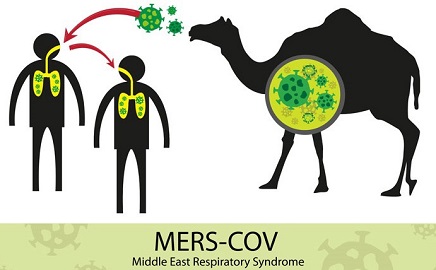Thailand Medical News Team Aug 16, 2023 1 year, 8 months, 5 days, 18 hours, 18 minutes ago
Medical News: In recent times, the global health community has been struck by a disconcerting reminder of the ever-present dangers posed by emerging infectious diseases. Amidst the ongoing concerns surrounding the COVID-19 pandemic, researchers and experts are sounding the alarm about the continued circulation of Middle East Respiratory Syndrome Coronavirus (MERS-CoV) in the Middle East, which harbors the potential to trigger a devastating global pandemic.

The UAE, a country not immune to the reach of MERS-CoV, has borne witness to a total of 94 confirmed cases and 12 fatalities since its first report in 2013. With a case fatality rate (CFR) of 13%, the gravity of the virus's impact cannot be understated. This figure aligns with the broader global landscape, where approximately 35% of MERS-CoV patients succumb to the infection, solidifying its reputation as a formidable and deadly adversary.
On a global scale, the World Health Organization (WHO) has diligently recorded the toll of MERS-CoV, capturing 2605 laboratory-confirmed cases and a staggering 936 related deaths from its emergence in 2012 through July 2023. These statistics featured in studies and
Medical News reports underscore the insidious nature of the virus and the urgent need for vigilant surveillance, preparedness, and collaborative efforts to thwart its expansion.
This warning has gained prominence due to a recent case reported in the United Arab Emirates (UAE), raising questions about the source of the infection, the virus's transmissibility, and the strategies needed to quell its spread.
The case in question, involving a 28-year-old male from Abu Dhabi, has drawn renewed attention to MERS-CoV, a viral pathogen responsible for Middle East Respiratory Syndrome (MERS). Despite its rarity, the infection's severity cannot be underestimated. The UAE, which had not reported any MERS-CoV infections since November 2021, suddenly found itself grappling with this mysterious case. The patient initially presented with a constellation of symptoms, including vomiting, right flank pain, dysuria (pain while urinating), and gastrointestinal distress.
Diagnosed with acute pancreatitis, acute kidney injury, and sepsis, the patient's condition quickly escalated, requiring intensive care and mechanical ventilation.
Laboratory analysis, conducted through the polymerase chain reaction (PCR) technique, confirmed the presence of MERS-CoV in the patient's nasopharyngeal swab. This incident serves as a stark reminder of the potential stealth with which the virus can infiltrate a population. What's particularly concerning is that the patient had no known comorbidities, recent travel history outside the UAE, or direct contact with animals that are known carriers of the virus, such as dromedaries, goats, or sheep. This highlights the complex and elusive nature of MERS-CoV transmission.
Contact tracing efforts have thus far not yielded any secondary cases among the patient's close contacts. The 108 healthcare workers who had been in contact with the patient were quarantined and monitored, thankfully testing negative for MERS-CoV. However, this incident underscores the need for an upgraded surveillance system capable of detecting potential secondary cases that may escape conventional m
onitoring.
The Middle East remains a hotspot for MERS-CoV infections, particularly within the Arabian Peninsula, where the virus circulates in dromedaries, also known as Arabian camels. This has led to heightened concerns regarding the possibility of the virus spreading to neighboring regions through infected travelers or migrating dromedaries. The World Health Organization (WHO) anticipates a continuation of MERS-CoV cases emerging from areas where the virus-carrying dromedaries are present, such as Qatar and Saudi Arabia.
MERS-CoV primarily manifests as a viral respiratory infection, ranging from mild to severe acute respiratory illness that can be fatal. Vulnerable populations, including the elderly and those with compromised immune systems or underlying chronic conditions, are at a higher risk of severe illness and mortality. With no specific vaccine or treatment currently available, management relies on supportive care tailored to the patient's clinical condition.
Dromedary camels have been identified as the primary source of MERS-CoV infection, with transmission occurring through direct or indirect contact with these animals and their raw products. The importance of practicing good hygiene, such as hand-washing and wearing protective clothing when handling these animals, cannot be overstated. Consuming raw animal products like milk, meat, blood, or urine without proper cooking or pasteurization poses a high infection risk.
Addressing the threat of MERS-CoV requires a multi-pronged approach. Enhanced surveillance systems, coupled with rigorous case management and infection prevention measures, are crucial in preventing the virus's spread. Adequate ventilation, spatial separation, and strict infection control protocols must be enforced in healthcare settings to prevent nosocomial transmission.
Furthermore, a 'one health' approach, which emphasizes the interconnectedness of human, animal, and environmental health, is imperative. Regular screening of individuals who have close contact with dromedaries, as well as laboratory testing of these animals, can aid in early detection and containment efforts. Sharing genetic sequence data and conducting genome analyses are pivotal in understanding the virus's evolution and predicting potential mutations.
The shadow of the COVID-19 pandemic has underscored the importance of preparedness and a comprehensive 'one health' strategy to combat infectious diseases. Investments in infrastructure and capacity development, forged during the pandemic, can be harnessed to address the gaps in MERS research and implementation. Collaboration between researchers, medical professionals, and organizations is paramount in devising effective response mechanisms against MERS-CoV and other potential pandemic threats.
In conclusion, the recent MERS-CoV case in the UAE serves as a stark reminder that the threat of emerging infectious diseases continues to loom large. Vigilance, early detection, and robust containment strategies are essential in mitigating the potential for a widespread outbreak. As global health organizations and governments grapple with the ongoing challenges posed by MERS-CoV and similar pathogens, a united and interdisciplinary approach is paramount to safeguarding public health and preventing future pandemics.
Reference:
https://www.sciencedirect.com/science/article/pii/S2405857223000839
For more about MERS-CoV, keep on logging to Thailand
Medical News
